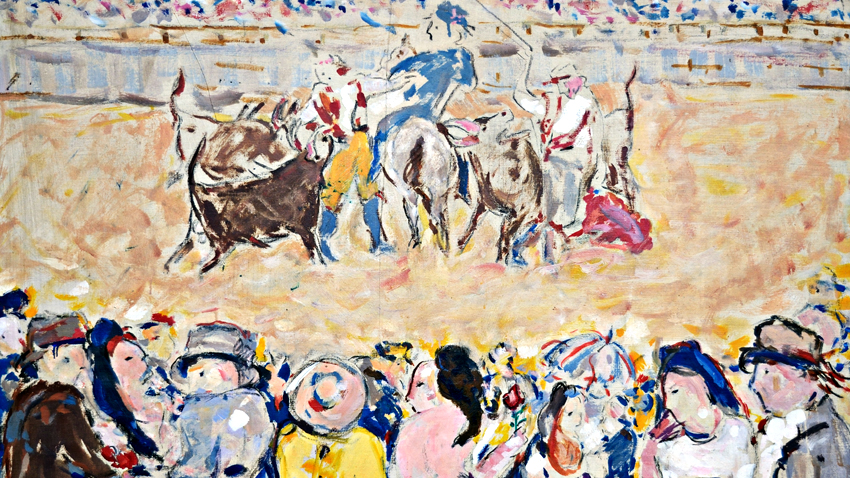Until May 26, 2016 visitors of the Sofia City Gallery can see a project by art expert Krasimir Iliev, entitled “Forms of Resistance /1944-1985/.” The exhibition focuses on the way artists in Bulgaria reacted against the pro- Soviet government of the country after 1944, especially after the state tried to subdue them to its mechanisms and dogmas.
 Trying to impose the realism coming from the Soviet Union the then-authorities accused artists of formalism. The first 12 years of the new regime were especially hard. During that time the system tried to order artists what to draw and how to do it. Thus their art became deformed, no matter if they were accepted or rejected by the propaganda. In the halls of the Sofia City Gallery, one can also see dossiers and protocols that could help us understand this period of the history of Bulgarian art. One can learn about repressions, bans and difficulties artists had in presenting works that showed reality.
Trying to impose the realism coming from the Soviet Union the then-authorities accused artists of formalism. The first 12 years of the new regime were especially hard. During that time the system tried to order artists what to draw and how to do it. Thus their art became deformed, no matter if they were accepted or rejected by the propaganda. In the halls of the Sofia City Gallery, one can also see dossiers and protocols that could help us understand this period of the history of Bulgarian art. One can learn about repressions, bans and difficulties artists had in presenting works that showed reality.
The exhibition includes works by Alexander Zhendov who first confronted the new reality. Visitors can actually see the works of 40 artists who tried to express their inner resistance and suffering from the fact that they had to withdraw from the cultural life of the country and to say goodbye to the audience.
“For example, torn by critics, artist Kiril Petrov retired to his native village, but in this difficult period he reached incredible creative heights,” Krasimir Iliev says.
Vasil Barakov, Iliya Beshkov and even Vladimir Dimitrov aka the Master at some point stopped painting. Boris Denev was banned from working and he started living in the countryside, where he was sketching on small pieces of cardboard. Imprisoned in the Belene camp, Peter Baychev continued to struggle through his art. Hristo Yavashev and Lubomir Dalchev fled abroad. Only Genko Genkov tried to speak publicly against the regime.

In the 1960s, 1970s and 1980s, a gradual easing of the restrictions took place, allowing Zlatyu Boyadzhiev, Galin Malakchiev and Alexander Dyakov to "legalize their rebellion." In 1989 and 1990, even works by Rayko Alexiev and Alexander Dobrinov were shown to the people.
Part of the exhibition is a surreal painting by Ivan Petkov entitled „Lobotomy" that metaphorically examines the attempt of ideology to take away human rights and one’s ability for critical thinking. In a world in which even a bit of colorfulness was blamed of being impressionism, the artists whose works are included in the exhibition try to preserve their originality. People now can see works and documents shedding light on the truth about that period. “Guests often come to the exhibition more than once; watching and pondering,” Krasimir Iliev says.
English: Alexander Markov
Nicholas is 15 years old . He is a self-taught artist, but his maturity in creativity and strength of spirit inspire admiration in everyone who has touched his talent. He is a person who fights internal battles and continues in moments when something..
Four Bulgarian artists — Zhivko Tenev-Gissen, Maya Cholakova, Ivaylo Tsvetkov and Anatoliy Stankulov — have been chosen to take part in the 20th Caratinga International Humor Salon Caratinga 2025 in Brazil, which will run from 21 to 26 October,..
Bulgarian poet and haiku author Vladislav Hristov has won the grand prize in the 79th Basho Memorial English Haiku Contest organized by the Matsuo Basho Memorial Museum in the city of Iga, Japan. For the first time, a Bulgarian has..
To celebrate the 120th anniversary of the birth of Bulgarian intellectual Dimitar Nenov, a screening of the music documentary Dimitar Nenov and the..
A special exhibition dedicated to the 140th anniversary of the Unification of the Principality of Bulgaria and Eastern Rumelia has been presented in the..
On this day five years ago (in 2020), a memorial plaque dedicated to the world-renowned Bulgarian bass Nicolai Ghiaurov (1929–2004) was unveiled in Modena...

+359 2 9336 661
